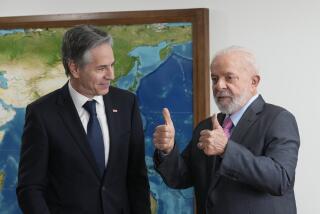France’s Nicolas Sarkozy seeks Group of 20 meeting on Japan
- Share via
French President Nicolas Sarkozy has called on leading economic powers to gather next month and discuss the global consequences of the earthquake, tsunami and nuclear threat that have plunged Japan, the world’s No. 3 economy, into crisis.
An emergency meeting of the Group of 20 economic and energy ministers was proposed by France on Monday night at a session of the Group of 8 powers in Paris. Monday’s meeting had been convened to craft a strategy for deterring bloodshed and unrest in Libya.
The G8 foreign ministers remained at odds about whether to impose a no-fly zone over Libya, where the superior armaments and air force of Libyan strongman Moammar Kadafi have driven back rebels fighting for an end to his 41-year-old authoritarian regime. Government forces have used air power to fire on the poorly armed and trained rebels, who had earlier captured important coastal cities and oil sites in the see-saw battle that has been raging for nearly a month.
The foreign ministers referred the no-fly zone debate to the United Nations Security Council, calling on the world body to reopen discussion on Libya and consider other measures to deter the use of force by Kadafi’s loyalists, Italian Foreign Minister Franco Frattini said after the Paris gathering.
Attention instead turned to the mounting economic threats in Japan.
“President Sarkozy has proposed a meeting of G20 economy and energy ministers to discuss the impact of the earthquake on the global economy and the world energy system,” Frattini said.
Japan is also the world’s third-largest oil consumer, and demand could grow as the disaster-plagued nation seeks to replace lost nuclear power capacity. Nuclear energy supplied 30% of the island nation’s power needs before Friday’s 8.9-magnitude earthquake damaged a reactor complex in northeast Fukushima prefecture, forcing a shutdown of much of the national nuclear system. The earthquake and the devastating tsunami that followed knocked out the power supply to the cooling system at several of the reactors, triggering a series of hydrogen explosions and raising fears that a major accident and nuclear contamination could be looming.
More to Read
Sign up for Essential California
The most important California stories and recommendations in your inbox every morning.
You may occasionally receive promotional content from the Los Angeles Times.














